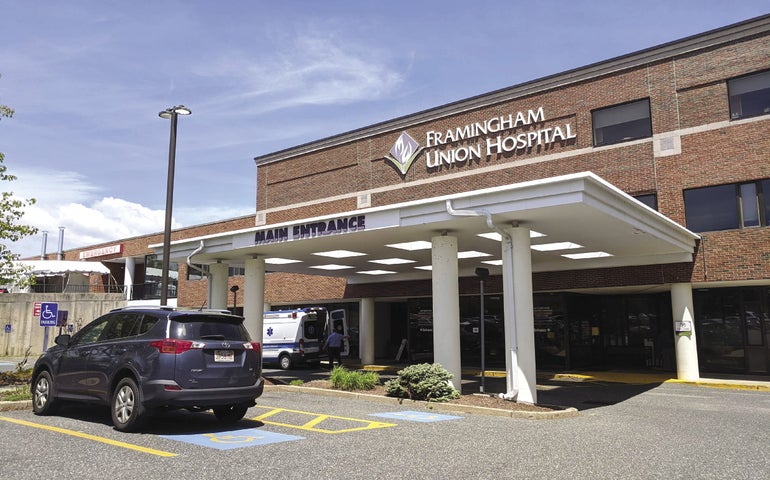Following public outcry and pressure from the Massachusetts Department of Public Health, MetroWest Medical Center will no longer close its neonatal intensive care unit at its Framingham Union Hospital, opting to instead keep a step-down NICU open.
On Aug. 9, Framingham Union will transition from its 12-bassinet Level II NICU Service, also known as a Special Care Nursery, to a Level IB nursery: a NICU serving newborns requiring a higher level of care and monitoring but without advanced respiratory services offered at the Level II classification.
Framingham Union originally stated it was preparing to transition to a step-down NICU facility instead of shutting it down completely in a May 29 letter to DPH. The hospital said it was in the final stages of establishing a formal agreement to provide the advanced neonatal practitioner coverage required for a Level IB designation, adding if the agreement could not be finalized, the NICU would instead be turned into a Level IA designation, also known as a well-baby nursery for healthy babies born at term.
DPH and the Massachusetts Nurses Association, the labor union representing nurses at Framingham Union, confirmed with WBJ on Monday the hospital would transition to the scaled-down facility.
“While we believe this community still deserves a Level II B nursery, we are encouraged to see that Tenet has agreed with our recommendation, to maintain a Level I B nursery, which will allow the hospital to still serve and protect newborns requiring a higher level of care and monitoring,” MNA President Katie Murphy said in an email to WBJ.
Tenet Healthcare, the Dallas-based owner of Framingham Union, did not reply to WBJ’s request for comment.
“For nurses at Framingham Union, it was gratifying to see the community turnout at the DPH public hearing to join us in our advocacy for this service and also to see how that effort and community engagement may have modified Tenet’s plan. This is why the nurses formed a union through MNA, to have a voice and the power to engage with our community to ensure they have access to the services they need to protect their health and well being,” Murphy said.
Framingham Union originally announced on Feb. 10 in a letter to DPH it intended to close its NICU by June 10 and solely care for healthy babies without critical health needs.
At the time, MetroWest Medical Center, the operator of Framingham Union, attributed the closure to shrinking patient volumes and staff retention difficulties.

“Specialized neonatal respiratory therapists and Level IIB Special Care Nursery-trained nurses require ongoing exposure to critically ill newborns to retain their skills. Due to the low volume of admissions, maintaining staff competency in providing high-acuity neonatal care has been challenging. For these reasons, maintaining a fully staffed service with appropriate specialized neonatal care is financially and operationally unsustainable,” John Whitlock, the former CEO of MetroWest Medical Center, wrote in the letter before he left the role to be CFO at Lawrence General Hospital and Holy Family Hospital in Haverhill and Methuen.
In July, MetroWest Medical Center named Greg McFarland as its new CEO, marking the center’s seventh leader in eight years.
Framingham Union nurses rejected this reasoning for the NICU closure, stating the hospital was experiencing a reduction in utilization due to the hospital having gradually reduced its OBGYN providers to only two, not because of lowered need.
After the announcement, DPH hosted a public hearing on April 9 with MNA members, health care providers, and community advocates decrying Framingham Union’s decision, citing concerns including lack of accessible alternative sites and the need to recruit and retain local OB/GYN practitioners.
“Let’s be clear, there’s no justification for Tenet Healthcare … [to] be going into communities with high-risk mothers and taking away care that they need, that could save them or their babies lives. No justification for it. It’s obscene,” David Schildmeier, the MNA’s director of public communications, said to WBJ.
Later in April, DPH made the determination the neonatal intensive care facility was medically necessary to the region.
“As a result of its review, the department has made a finding that the services provided by the Hospital are in fact necessary for preserving access and health status within the Hospital’s service area,” Stephen Davis, director of DPH’s Division of Health Care Facility Licensure and Certification, wrote in an April 24 letter.
Shortly after, DPH sent a letter demanding further details on how MetroWest Medical Center planned to ensure neonatal intensive care would be maintained throughout the area after its NICU closure. Furthermore, the agency echoed the MNA’s request to transition to a Level IB nursery instead of wiping NICU services entirely.
In response, Denten Park, CEO of Tenet’s Massachusetts market, wrote in the letter to DPH that MetroWest Medical Center was actively exploring this transition.
“MWMC leadership fully supports this approach as a means to balance patient safety, community expectations, and operational viability. Detailed assessments and active negotiations are underway to finalize the affiliation, staffing model, and operational logistics necessary to implement this preferred approach effectively,” Park said in the letter.
With 229 licensed beds, MetroWest Medical Center is the third-largest hospital in Central Massachusetts when ranked by number of licensed beds, according to data collected by WBJ’s Research Department.
Mica Kanner-Mascolo is a staff writer at Worcester Business Journal, who primarily covers the healthcare and diversity, equity, and inclusion industries.

